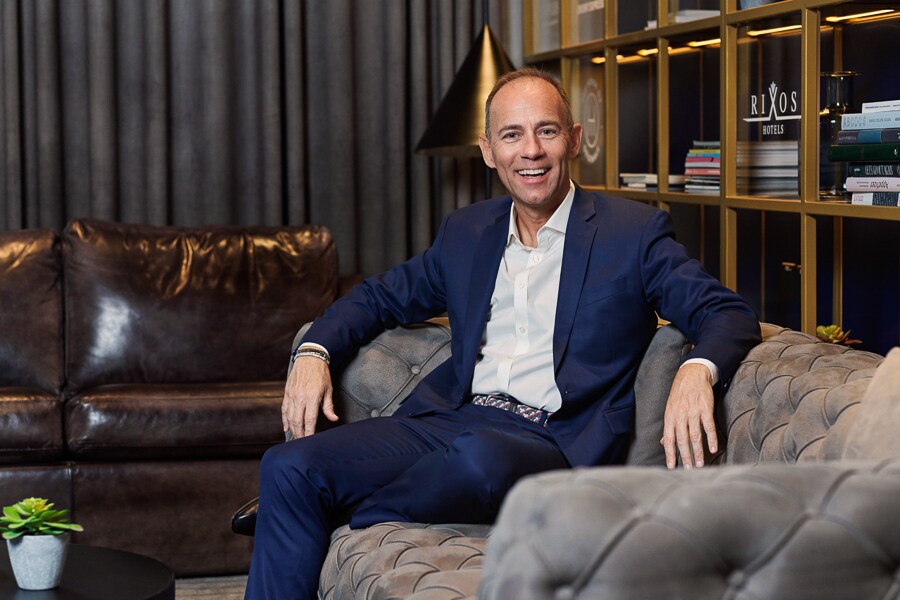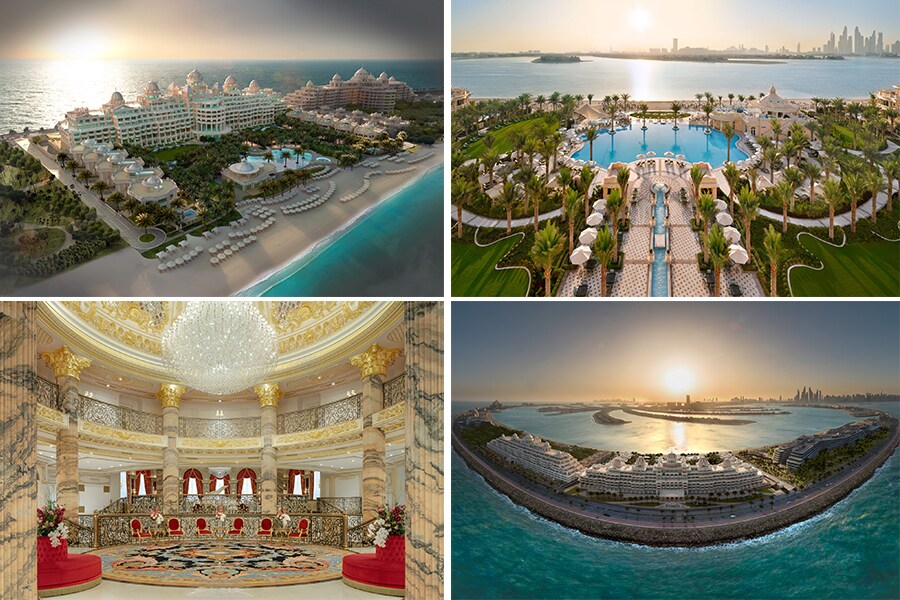After pandemic uncertainty, people are looking for lavish but mindful experience
The CEO of Accor India, Middle East, Africa, and Turkey, on the recovery of the luxury hospitality sector and opening a new property in Palm Jumeirah, Dubai


 Mark Willis, CEO of Accor. Photo courtesy: Accor[br]
Mark Willis, CEO of Accor. Photo courtesy: Accor[br]
Large, ultra-luxury hotels in India and around the world have suffered heavy losses in the last 18 months due to Covid-19-related travel restrictions and lockdowns. Many hotel employees lost their jobs and a few hotels shut shop for good. Industry experts believe there might be a few more casualties in the next few months.
In such uncertain times, global hospitality group Accor will be opening an ultra-luxury resort Raffles The Palm Dubai at the end of this year. The 389-key property will be situated within a 100,000 sqm landscape on the West Crescent of Palm Jumeirah.
The French hospitality group, which is the largest in Europe, owns, manages and franchises hotels, resorts and vacation properties, and has 5,000 hotels and 10,000 food and beverage venues in 110 countries. It has over 40 brands including Raffles, Pullman, Sofitel and Ibis among others.
Accor also has a diverse portfolio in India with 52 properties in 22 key destinations in India. Its brands here include Fairmont, Sofitel, Pullman, Mà¶venpick, Grand Mercure, Novotel and Ibis.
After almost a year’s delay, Accor is now also set to open a Raffles property, its first Raffles in India, in Udaipur on August 2. Situated in the middle of Udai Sagar Lake, it has 101 suites and rooms. Raffles Jaipur, which was also delayed due to the pandemic, is still in the works.
Mark Willis, CEO - India, Middle East, Africa, and Turkey, Accor, speaks to Forbes India about what it takes to open luxury properties in the year of the pandemic, global hospitality trends and Accor Hospitality Company’s plans for India.
Q. How is the luxury hospitality sector faring currently?
The pandemic has shifted many perspectives including how people travel and look at luxury brands. It has set in motion a new era of conscious luxury.
We are seeing a return of luxury travel across the globe, in countries that are opening (after the Covid-led lockdowns and travel restrictions). Things are looking bright for the luxury segment as after all the uncertainty that people have been through due to the pandemic, they are now looking for ways to indulge in lavish but mindful experiences.
The sector is recovering. Taking an example from India, hotels like Fairmont Jaipur witnessed an uptick in consumption in no time when the country was in the unlock phase after the first wave. The recovery that we saw in our luxury segment was very encouraging. We also saw many people from India go to the Maldives, and that is a very significant indication of recovery of the luxury hospitality sector.
In Morocco, Egypt and Turkey, we have started to see an increased demand for local stays or staycations, where families can enjoy a small break without having to travel far. In the Middle East, and in particular the UAE, we have been seeing our luxury properties return to positive business levels since Q3 2020, especially during the weekends.
The quick recovery in the UAE can mainly be attributed to the rapid action the government took in containing the spread [of Covid-19] as well as the vaccination programme, under which nearly 14 million-plus people have been vaccinated to date. Such activities place the UAE, mainly Dubai, on top of global travellers’ list as a safe and secure location to visit.
Q. How soon do you think the hospitality sector will recover in the aftermath of Covid-19?
In India, we are reviewing things quarter by quarter to stay aligned with government restrictions.
Global corporate travel is one of the key driving components for the hospitality industry. But for now, the domestic SME (Small and Medium-Sized Enterprises) market has recovered much quicker.
There’s also a significant shift in the nature of the MICE (Meetings, Incentives, Conventions and Exhibitions) business. Business conventions have been replaced by business associated with weddings, social events, Covid-related occupancies, and sports events.
It is still hard for anyone to predict when our industry will completely recover. We witnessed encouraging signs of recovery after the first wave, we are confident the market will behave in a similar way now as well.
Q. What are the biggest trends in luxury hospitality today?
Undeniably, there is going to be a strong focus on safety, security and well-being. At Accor, we follow the ALLSAFE cleanliness and safety standards. It is a global sanitisation programme, vetted by Bureau Veritas, a world leader in testing, inspections and certification of hygiene standards.
Conscious luxury will also be the focus of luxury hospitality. Travellers are looking for meaningful experiences that allow them to develop deeper connections with their loved ones and the environment. There is a magnified focus on personalisation of experiences as well.
Mindful travel is another big trend we see in luxury hospitality. Experiences that are rooted in responsible travel, that give back to communities, and give access to nature are increasingly in demand.
Touchless hospitality backed by technology adaption in the industry has set the tone for a rise in cashless transactions for the hotel sector. Customer-facing tech tools need to be deployed to provide remote access to front-desk, concierge and customer-service functions, starting from booking the room to check-in, check-outs and placing dining orders. Everything must be contactless.
In line with these developments, earlier this year, we rolled out Accor Key, which will provide guests a keyless door entry solution while ensuring that hotels do not lose the human touch required. On arrival, guests will receive their room key virtually upon downloading Accor’s digital key app, giving them access to rooms, entry to meeting rooms and floor access via lifts using their smartphone.
Accor is also collaborating with Microsoft to launch ALL CONNECT, a new hybrid meetings concept supported by Microsoft Teams that will enable guests around the world to adapt to new ways of working. This new offering will enable corporate customers and meeting planners to combine physical, in-hotel meetings with virtual interactions across multiple locations simultaneously.
Q. Why did Accor decide to open such a large, ultra-luxury property (Raffles The Palm Dubai) in such uncertain times?
We have always had a forward-looking approach when it comes to signing or opening new properties. We are aware that the climate globally is uncertain. However, we see strong signs of recovery in the Middle East and more so in Dubai.
Dubai is a main traveling hub and a melting pot of cultures for tourists from across the world. Historically, the luxury consumption in Dubai has been high and we expect that to continue.
 Photo Courtesy: Accor
Photo Courtesy: Accor
Q. How different has it been opening a property in the pandemic? What have been the challenges?
Opening a hotel in the best of times can be challenging. The difficulties the pandemic has thrown at us have indeed added some more challenges. One such is not being able to train our hotel teams in person. We had to do it virtually. Another challenge is the delays in international deliveries due to country border restrictions. We, therefore, had to look for replacements locally.
Nevertheless, we have managed to overcome all the difficulties by working together as a team, being flexible and adapting to find solutions at short notice.
Q. How open are customers to staying in large hotels today?
The key to reassuring guests and building confidence with respect to hotel stays will be the industry’s focus on hygiene and safety measures.
Another aspect that is going to play a big role is how hotels can offer differentiated products and top-up services over and above what is expected from them. We have partnered with AXA, a global leader in insurance, to provide medical support to guests across the 5,000 Accor hotels worldwide.
In the post-Covid rebound phase, offerings like these will be key to rediscover the love of travel for hotels of all sizes.
Q. What does the future for luxury hotels look like, especially in the India and Middle East region?
We strongly believe that the future of luxury hotels is very bright. Raffles is the tenth brand that Accor is introducing in India. There is a promising future for luxury brands in the region and there are discerning customers that are actively looking for memorable, luxurious experiences which a brand like Raffles delivers.
We have robust expansion plans for India, the Middle East, Africa and Turkey. We have a number of key openings in the coming months, including a couple of Raffles properties in Bahrain, Doha and the Kingdom of Saudi Arabia as well as Fairmont properties in Morocco, Saudi Arabia and Doha. We will also open a few lifestyle properties in Dubai this year.
SLS Dubai Hotel & Residences opened its doors in April 2021, 25hours Hotel Dubai and Hyde Dubai are scheduled to open in Q3 2021.
Q.What are Accor’s plans for India?
Similar to Accor’s focus globally, our strategy in India is to expand and be closer to our guests, owners and employees than ever before, and improve system-wide efficiencies.
We want to focus on delivering an unparalleled hospitality experience through infinite, connected moments–stay, play, work, host weddings, etc.
We have a strong development pipeline that supports our long-term plans while we continue to grow our network with our owner partners in India. We will be launching the first Raffles in August.
First Published: Jul 10, 2021, 09:00
Subscribe Now